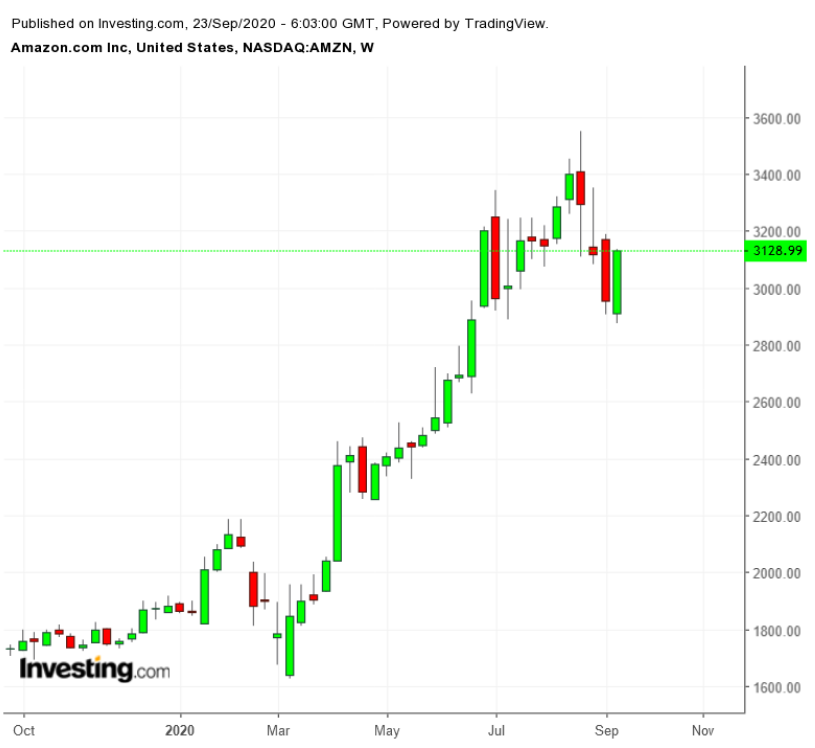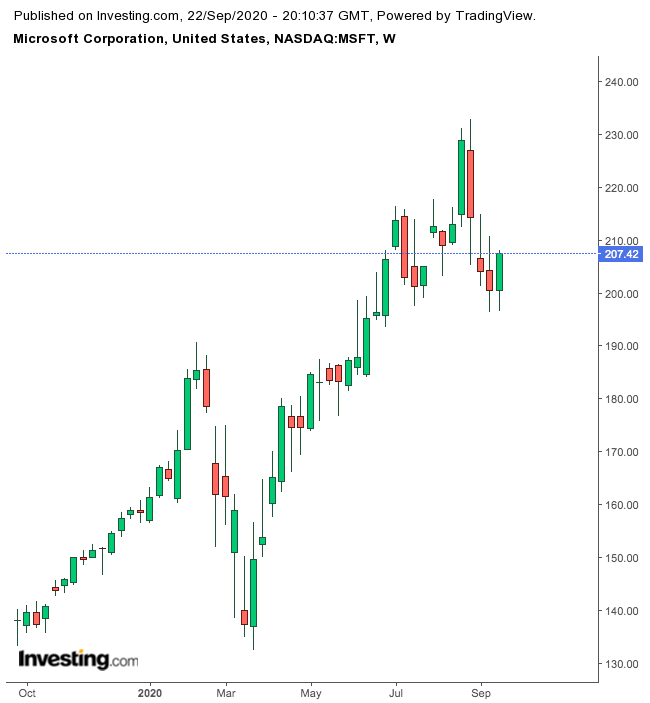The world’s largest technology companies have carved out a unique role during the COVID-19 pandemic. They are now considered defensive plays thanks to their entrenched competitive position and relative immunity from the pandemic-induced economic downturn.
During the past two quarters, their earnings have shown that these tech giants have not only remained insulated from the global health crisis, but have actually thrived during one of the steepest economic downturns in U.S. history.
Though the rally of the past six months has pushed their stock prices into overbought territory, the correction that started this month is providing some better entry points for long-term, buy-and-hold investors.
Below we take a look at Amazon (NASDAQ:AMZN) and Microsoft (NASDAQ:MSFT)—two companies with market caps of more than $1 trillion—to understand which stock is a better buy after the recent dip.
Amazon
E-commerce powerhouse Amazon.com proved to be a great bet during this pandemic. When consumers were forced to stay home, they had no other option but to go online to make purchases.
Amazon’s business model perfectly positioned it to expand its e-commerce dominance, further broadening its sales and reach. Its stock, which initially weakened during the early days of the virus outbreak, subsequently skyrocketed, almost doubling in value by early September.
That rally, however, is showing some signs of peaking, sending Amazon stock down about 14% from its record high, fuelling debate among investors whether it’s the right time to buy, or wait on the sidelines. It’s, of course, almost impossible to predict the short-term moves in the market, but looking at Amazon’s business model, it’s not difficult to conclude that this company will continue to benefit from the secular shift to e-commerce.

One of Amazon’s biggest strengths is its paid membership program, one of the largest in the world. In exchange for an annual fee, its Prime membership offers free, expedited shipping on a variety of items. Members also benefit from streaming movies, TV shows and music as well as members-only deals.
Over time, the program has helped entice customers who once might have only used Amazon for books and movies. Today, Prime boasts more than 150 million paid members.
Though Amazon’s online marketplaces generate most of the Seattle-based company's revenue, it's not the most profitable segment. Amazon is also the world’s largest cloud-infrastructure provider, with Amazon Web Services generating the largest share of the profit.
Due to this business strength, all 36 major analysts now have a buy rating on Amazon, according to TipRanks.com. Bernstein, the last major investment firm with a hold rating, upgraded the stock yesterday, saying it was using the recent pullback to go long the shares after missing the comeback since March. According to Bernstein:
“COVID has pulled forward secular trends, from e-commerce to digital advertising and cloud, with Amazon as a primary beneficiary across all three revenue pools.”
The firm also noted that the e-commerce giant has “quietly made substantial inroads into grocery and ‘shopping’ verticals,” which should only increase the company’s share positions down the line as brick-and-mortar stores reopen.
Microsoft
Since March, Microsoft shares have had an amazing run. Investors sent the stock soaring after seeing strong sales growth powered by sustained demand for its cloud-computing services, as customers shift more work online during the coronavirus pandemic.
Sales for Azure, Microsoft’s closely watched cloud-computing service, grew by 47% in Q2 from a year earlier. The business notched 59% growth in the preceding period and 64% in the same quarter of the previous year.
As the post-pandemic rally falters, Microsoft shares also lost some ground, falling about 13% from a record high reached this month. It’s likely that Microsoft could head lower if the current market correction deepens.

That said, the Washington state-based software behemoth is one of the safest long-term bets in the technology space. That makes its shares worth buying when they become cheaper. The reason for this optimism is simple: Microsoft has made all the right moves during the past decade. It’s now in the gratifying position of being able to mine the rewards of its previous investments.
Following a massive transformation spearheaded by Chief Executive Satya Nadella, which started more than five years ago, the company has become one of the most powerful players in the fast-growing cloud-computing market, commanding the segment's second-largest market share, behind only Amazon.
Morgan Stanley analysts recently reiterated their “overweight” rating on Microsoft, raising their price target to $245 from $230. Combined with “mid-teens” earnings growth, the analysts see Microsoft’s total return profile as being at a “durable and attractive level” during these unclear times.
Paired with 10% revenue growth, further margin expansion, and share repurchases, the analysts believe the stock to have a premium return profile “versus the broader market, which is still not fully reflected in the shares.”
Add Microsoft's rock-solid dividend and excellent track record on payouts to the stock's appeal and it looks like an even more attractive investment—especially during an uncertain economy.
Since 2004, when the tech giant first began paying a dividend, its payout has swelled more than four-fold. Currently its annual yield is 1.11% with a quarterly payout of $0.56 per share, after incorporating a 10% dividend hike announced last week.
Bottom Line
As investors continue to remain jittery about the global economic outlook amid fears about the second wave, any weakness in both Amazon and Microsoft stock should be considered a buying opportunity. Both companies are among the most resilient tech giants, and each is well positioned to continue on their growth trajectories.
